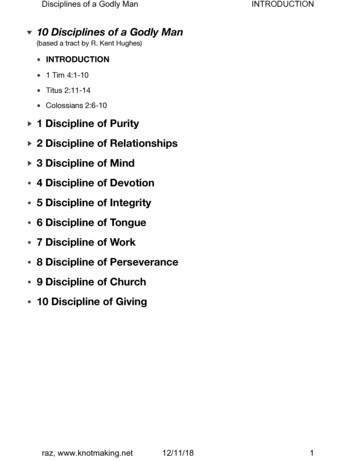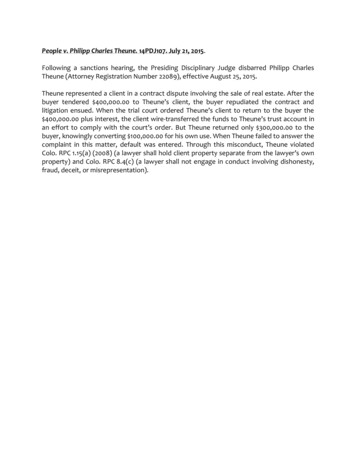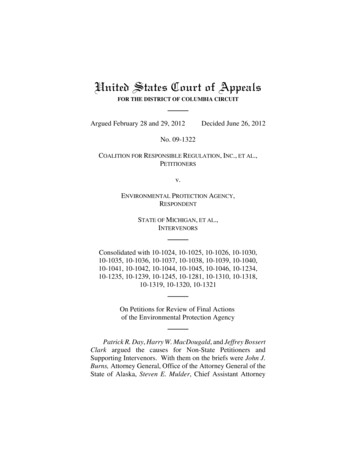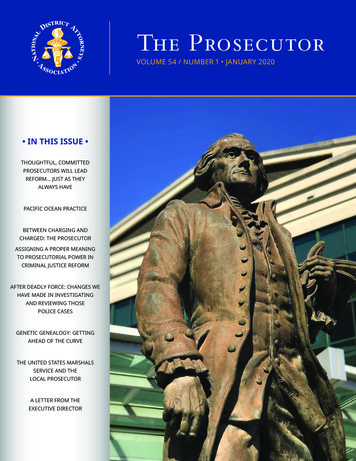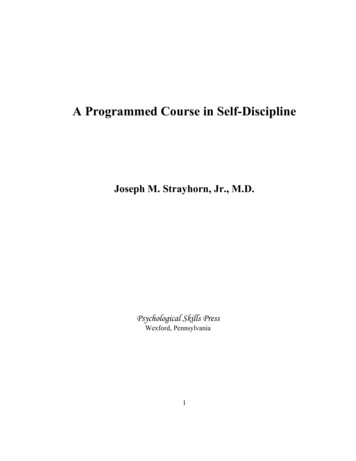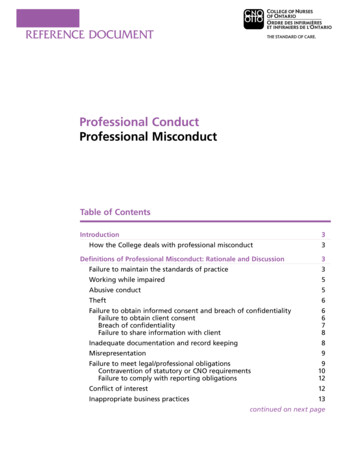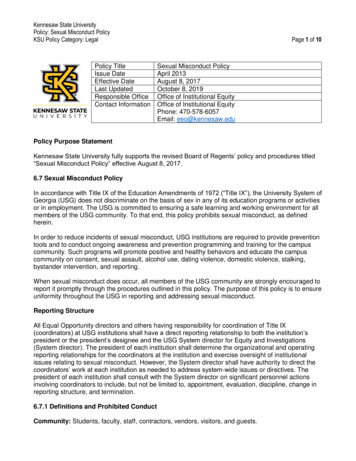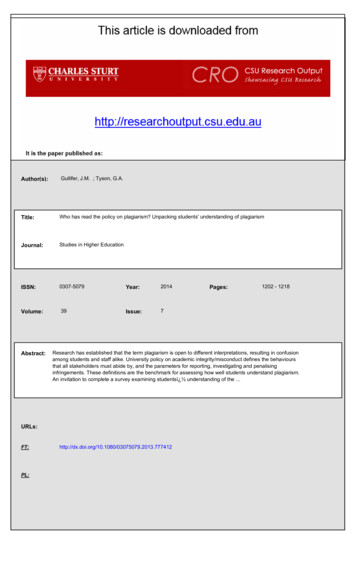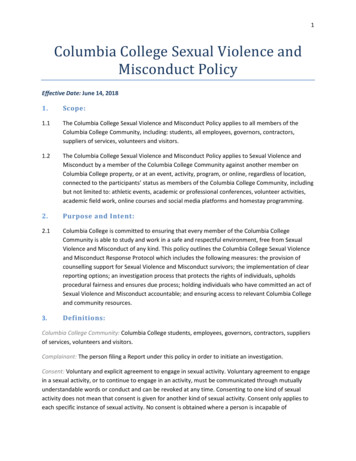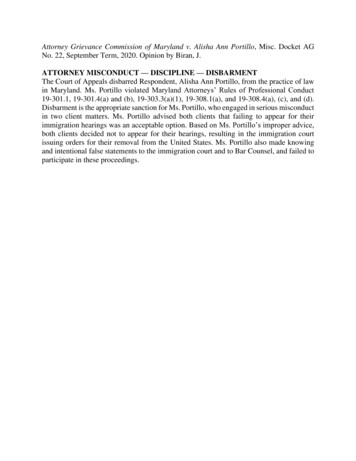
Transcription
Attorney Grievance Commission of Maryland v. Alisha Ann Portillo, Misc. Docket AGNo. 22, September Term, 2020. Opinion by Biran, J.ATTORNEY MISCONDUCT — DISCIPLINE — DISBARMENTThe Court of Appeals disbarred Respondent, Alisha Ann Portillo, from the practice of lawin Maryland. Ms. Portillo violated Maryland Attorneys’ Rules of Professional Conduct19-301.1, 19-301.4(a) and (b), 19-303.3(a)(1), 19-308.1(a), and 19-308.4(a), (c), and (d).Disbarment is the appropriate sanction for Ms. Portillo, who engaged in serious misconductin two client matters. Ms. Portillo advised both clients that failing to appear for theirimmigration hearings was an acceptable option. Based on Ms. Portillo’s improper advice,both clients decided not to appear for their hearings, resulting in the immigration courtissuing orders for their removal from the United States. Ms. Portillo also made knowingand intentional false statements to the immigration court and to Bar Counsel, and failed toparticipate in these proceedings.
Circuit Court for Montgomery CountyCase No. 482879-VArgued: Argument waived/submitted on papersIN THE COURT OF APPEALSOF MARYLANDMisc. Docket AG No. 22September Term, 2020ATTORNEY GRIEVANCE COMMISSIONOF MARYLANDv.ALISHA ANN PORTILLOBarbera, C.J.McDonaldWattsHottenGettyBoothBiran,JJ.Opinion by Biran, J.Filed: May 27, 2021Pursuant to Maryland Uniform Electronic LegalMaterials Act(§§ 10-1601 et seq. of the State Government Article) this document is authentic.2021-06-17 14:44-04:00Suzanne C. Johnson, Clerk
As an officer of the court, a Maryland attorney should not advise a client that failingto appear at a court hearing at which the client’s presence has been ordered is an acceptableoption. This case concerns an attorney, Alisha Ann Portillo, who gave that improper adviceto two immigration clients. To make matters worse, after the clients failed to appear fortheir hearings based on Ms. Portillo’s advice, Ms. Portillo made false statements to thepresiding immigration judges about the clients’ whereabouts and her firm’s last contactswith the clients. And, after the clients subsequently complained about Ms. Portillo’sactions, Ms. Portillo provided false and misleading statements to Bar Counsel. In light ofthis serious misconduct, on March 26, 2021, we issued a per curiam order disbarring Ms.Portillo. Attorney Grievance Comm’n v. Portillo, 472 Md. 721 (2021). We explain in thisopinion the reasons for that action.IBackgroundOn July 15, 2020, the Attorney Grievance Commission of Maryland (“Petitioner”),acting through Bar Counsel, filed a Petition for Disciplinary or Remedial Action(“Petition”) against Ms. Portillo, in connection with two complaints filed by former clientsconcerning their immigration matters. Petitioner alleged that Ms. Portillo violatedMaryland Attorneys’ Rules of Professional Conduct (“MARPC”) 19-301.1 (Competence),19-301.3 (Diligence), 19-301.4(a) and (b) (Communication), 19-303.3(a)(1) (Candor
Toward the Tribunal), 19-308.1(a) (Bar Admission and Disciplinary Matters), and 19308.4(a), (c), and (d) (Misconduct).1On July 17, 2020, under Maryland Rules 19-722(a) and 19-727, this Courtdesignated the Honorable Joan E. Ryon of the Circuit Court for Montgomery County toconduct an evidentiary hearing, and to issue findings of fact and conclusions of law.Thereafter, Ms. Portillo was served with a writ of summons, the Petition, Petitioner’sinterrogatories and request for production of documents, and request for admissions of factsand genuineness of documents. Ms. Portillo failed to comply with Petitioner’s discoveryrequests and to respond to the charges filed against her. The hearing judge entered an orderof default on October 21, 2020. The circuit court provided Ms. Portillo with notice of theorder of default, which advised Ms. Portillo that she could move to vacate the order ofdefault within 30 days after its entry. Ms. Portillo did not move to vacate the order ofdefault.On November 25, 2020, the hearing judge conducted an evidentiary hearingremotely via Zoom for Government. Bar Counsel appeared, but Ms. Portillo did not. UnderMaryland Rule 2-424(b), the matters set forth in Petitioner’s request for admissions of factsand genuineness of documents were deemed admitted, and the hearing judge received thoseThe Maryland Attorneys’ Rules of Professional Conduct are codified as MarylandRule 19-300.1 et seq. In an effort to enhance readability, we use abbreviated references tothe prior codifications of these rules, which are consistent with the ABA Model Rules onwhich they are based (e.g., Maryland Rule 19-301.1 will be referred to as Rule 1.1). SeeABA Compendium of Professional Responsibility Rules and Standards (Am. Bar Ass’n2017).12
admissions and documents in evidence. On January 13, 2021, the hearing judge issuedfindings of fact and conclusions of law. Neither party filed exceptions.On February 11, 2021, Petitioner filed a request to waive oral argument in thisCourt. On February 16, 2021, we entered an order directing Ms. Portillo to show cause whyoral argument should be held; Ms. Portillo did not respond. On March 10, 2021, we grantedPetitioner’s request to waive oral argument. We subsequently considered this case on thepapers.IIThe Hearing Judge’s Findings of FactWe summarize here the hearing judge’s findings of fact.BackgroundMs. Portillo was admitted to the Maryland Bar on June 17, 2014. During the periodrelevant to this case, Ms. Portillo was employed at the Law Offices of Hale W. Hawbecker,PLLC (the “Firm”), in Woodbridge, Virginia.Representation of M.D.M.D. left her native country of El Salvador in August 2016 and entered the UnitedStates on September 3, 2016. She was detained in Texas and placed in removalproceedings. On October 19, 2016, M.D. was released on bond and moved to Fairfax,Virginia. In January 2017, her case was transferred to the immigration court in Arlington,Virginia, and a Master Calendar Hearing was scheduled for October 5, 2017.On August 23, 2017, M.D. met with Mr. Hawbecker and retained the Firm torepresent her. She executed a retainer agreement that provided for a flat fee of 6,000, with3
1,000 to be paid at the outset, 500 by September 13, 2017, and 250 per month until paidin full. After the initial meeting, Mr. Hawbecker assigned Ms. Portillo to handle M.D.’scase. Although Mr. Hawbecker oversaw the Firm’s immigration matters, Ms. Portillo wasthe attorney responsible for M.D.’s matter.A paralegal at the Firm prepared M.D.’s asylum petition. The petition stated thatM.D. left El Salvador and feared returning because she was abused and threatened by herpartner’s brother, who was a gang member. Ms. Portillo reviewed the asylum petition, andon August 31, 2017, filed the petition in the Arlington immigration court, as well as hernotice of appearance on behalf of M.D.On October 5, 2017, Ms. Portillo appeared with M.D. at the Master CalendarHearing. The court scheduled M.D.’s individual hearing for December 11, 2018. Ms.Portillo told M.D. that, prior to the December 2018 hearing, M.D would need to provideher with additional evidence to support her asylum petition.In November 2018, Ms. Portillo reviewed M.D.’s file and realized that M.D. hadnot provided her with any additional corroborating evidence. Ms. Portillo called and leftvoicemails for M.D. three times between November 2018 and December 3, 2018, but didnot receive a response prior to December 4, 2018.On December 4, 2018, having not heard from M.D., Ms. Portillo prepared and fileda supplement to M.D.’s asylum application. The supplement contained general evidenceaddressing the treatment of El Salvador’s lesbian, gay, bisexual, and transgendercommunity. On December 10, 2018, M.D. called the firm about her hearing the next day.The receptionist told M.D. to come to the office at 10:00 a.m. the following day to meet4
with Ms. Portillo prior to the 1:00 p.m. hearing, which M.D. did. Although Ms. Portillocan speak Spanish, Ms. Portillo frequently used interpreters during her meetings. At themeeting between M.D. and Ms. Portillo on the morning of December 10, 2018, Ms.Portillo’s assistant served as an interpreter.Ms. Portillo advised M.D. during the meeting that M.D.’s case was weak and thatshe would likely be deported if she appeared at the hearing. Ms. Portillo advised M.D. that,if the court denied her asylum application, M.D. could appeal the decision, but it wouldcost an additional 2,500 in legal fees. Ms. Portillo further advised M.D. that M.D. wouldbe able to remain in the United States longer if she did not appear for the hearing. At theconclusion of their meeting, Ms. Portillo told M.D. that she had until noon to decidewhether to appear at the 1:00 p.m. hearing that afternoon.Based on Ms. Portillo’s advice, M.D. decided not to appear for the hearing. Ms.Portillo told M.D. that she would inform the immigration court that she had lost contactwith M.D. after the October 2017 hearing.Ms. Portillo appeared at M.D.’s hearing that afternoon. When the immigration courtasked Ms. Portillo about her communications with M.D., Ms. Portillo knowingly madefalse statements to the court:[O]ur office’s last communication with [M.D.] was in May of 2018, whenwe had her come in and do her application for her biometrics appointment.In October, we were calling her last known phone number and not receivinga response. We ended up mailing out a letter at the end of October, and fromthat letter, her ex-partner contacted our office and told us that she had left inOctober and returned to El Salvador, and they were no longer together andno longer on speaking terms.5
The hearing judge found that “Ms. Portillo fabricated her alleged communications withM.D.’s partner to mislead the immigration court regarding M.D.’s whereabouts.”Based on M.D.’s failure to appear at the hearing and Ms. Portillo’s falseinformation, the immigration court deemed M.D.’s asylum application abandoned andordered M.D. removed to El Salvador. The hearing judge found that, as a result of theremoval order, M.D. could have been arrested and deported at any time.Complaint of M.D.On February 12, 2019, M.D. filed a complaint with Bar Counsel. On March 5, 2019,Bar Counsel wrote to Ms. Portillo, enclosed the complaint, and requested a response. Ms.Portillo submitted written responses to Bar Counsel on March 25, 2019 and June 6, 2019.In both responses, Ms. Portillo failed to disclose her false statements to the immigrationcourt. The hearing judge found that Ms. Portillo’s statements to Bar Counsel wereknowingly and intentionally misleading.Representation of M.R.M.R. and her minor son, V.S., left their native country of El Salvador in October2013 and entered the United States on November 20, 2013. They were detained in Texasand placed in removal proceedings. On November 25, 2013, M.R. and V.S. were releasedand moved to Maryland to live with G.H., M.R.’s fiancé and V.S.’s father. M.R. and G.H.were married in August 2014.On or about June 15, 2014, M.R. and G.H. met with Mr. Hawbecker and retainedthe Firm to represent M.R. V.S. was a derivative party in M.R.’s immigration proceedings.M.R. executed a retainer agreement that provided for a flat fee of 3,250. M.R. made an6
initial payment of 1,000 that day and monthly payments thereafter. On August 13, 2014,Mr. Hawbecker filed a request to change venue from Houston, Texas to Arlington,Virginia. On November 28, 2014, Mr. Hawbecker lodged an asylum application with theimmigration court in Houston.In early 2015, M.R.’s case was transferred to the immigration court in Arlington,Virginia, and thereafter to Baltimore. On March 8, 2016, Mr. Hawbecker filed an asylumapplication on behalf of M.R. in the immigration court in Baltimore, and M.R.’s individualhearing was scheduled for August 21, 2018.In June 2017, Ms. Portillo began working for the Firm, and Mr. Hawbecker assignedM.R.’s case to Ms. Portillo. Ms. Portillo was the attorney responsible for M.R.’s matter atthe Firm.In May 2018, having reviewed M.R.’s case file, Ms. Portillo called M.R. andrequested that she schedule a meeting and provide additional evidence to support herapplication. In late May 2018, M.R. and G.H. delivered the requested documents to theFirm but did not meet with Ms. Portillo or anyone else that day. In early August 2018, Ms.Portillo called M.R. and left a message requesting that she schedule a meeting to preparefor the August 21 hearing. M.R. called the firm and scheduled a meeting for August 17,2018.On August 3, 2018, Ms. Portillo filed a supplement to M.R.’s asylum application.On August 17, 2018, M.R. and V.S. met with Ms. Portillo to prepare for the August 21hearing. Ms. Portillo advised M.R. that she would likely lose her case and that the courtwould order her to leave the country in 30 days. Ms. Portillo told M.R. that it was M.R.’s7
decision whether to attend the hearing. Based on Ms. Portillo’s advice, M.R. was scared ofbeing deported and did not appear at the hearing on August 21, 2018.On August 21, 2018, Ms. Portillo appeared at M.R.’s hearing and made knowinglyfalse statements to the immigration court:The last contact that our office had directly with the lead Respondent, [M.R.],was in March of 2016. Her husband has been the one that has been in contactwith us and actually brought us evidence back in May, which we submittedin the supplement.However, when we brought her in to start her declaration, the husbandinformed us that [V.S.], who was enrolled in school, was having problems atschool and moved in with his aunt, Reina (phonetic) in Virginia, and that[M.R.] and [V.S.] were living with Reina. We were given the phone number.When we spoke with Reina, Reina advised us that they had moved back withthe husband, and the husband is stating that they do not reside there . Sowe have lost contact with them. And we honestly don’t know where they are.Both are saying that they live with the other.The hearing judge found that “Ms. Portillo fabricated her alleged communications withM.R.’s husband and sister to deceive the immigration court.”Based on M.R.’s failure to appear for the hearing and Ms. Portillo’s falseinformation, the immigration court deemed M.R.’s asylum application abandoned andordered M.R. and V.S. removed to El Salvador. The hearing judge found that, as a resultof the removal order, M.R. and V.S. could have been arrested and deported at any time.Complaint of M.R.On March 20, 2019, M.R. filed a complaint with Bar Counsel. On April 12, 2019,Bar Counsel wrote to Ms. Portillo, enclosed the complaint, and requested a response. Ms.Portillo submitted her written response to Bar Counsel on May 20, 2019. In her response,Ms. Portillo stated that, leading up to the August 21, 2018 hearing date, she attempted to8
contact M.R. on several occasions to schedule a meeting for August 17. Ms. Portillo furtherstated that M.R.’s husband called the office and advised that M.R. and V.S. were livingwith M.R.’s sister in Virginia. Ms. Portillo stated that she contacted M.R.’s sister, who saidthat M.R. and V.S. had moved back to Gaithersburg with M.R.’s husband. Ms. Portillofurther stated in her response that she did not meet with M.R. or her family on August 17,2018, or at any time prior to the August 21 hearing. The hearing judge found that Ms.Portillo’s statements to Bar Counsel were knowingly false.IIIThe Hearing Judge’s Conclusions of LawBased on the record and the above-summarized findings of fact, the hearing judgeconcluded, by clear and convincing evidence, that Ms. Portillo violated Rules 1.1, 1.3,1.4(a) and (b), 3.3(a)(1), 8.1(a), and 8.4(a), (c), and (d). Neither Ms. Portillo nor Petitionerfiled exceptions.IVStandard of Review“This Court has original and complete jurisdiction in an attorney disciplinaryproceeding and conducts an independent review of the record. The hearing judge’s findingsof fact are left undisturbed unless those findings are clearly erroneous. We review thehearing judge’s conclusions of law without deference.” Attorney Grievance Comm’n v.Hoerauf, 469 Md. 179, 207-08 (2020) (cleaned up). Where, as here, neither party files anyexceptions to the hearing judge’s findings of fact, we “may treat the findings of fact as9
established.” Md. Rule 19-741(b)(2)(A). We deem the hearing judge’s findings of fact tobe established in this case.VMs. Portillo’s Violations of the Rules of Professional ConductWe now consider the hearing judge’s conclusions of law. For the reasons we discussbelow, we hold that clear and convincing evidence demonstrates that Ms. Portillo violatedRules 1.1 (Competence), 1.4(a) and (b) (Communication), 3.3(a)(1) (Candor Toward theTribunal), 8.1(a) (Bar Admission and Disciplinary Matters), and 8.4(a), (c), and (d)(Misconduct). We conclude that Ms. Portillo did not violate Rule 1.3 (Diligence).Rule 1.1 (Competence)Rule 1.1 dictates that an attorney “shall provide competent representation to a client.Competent representation requires the legal knowledge, skill, thoroughness andpreparation reasonably necessary for the representation.”Ms. Portillo violated Rule 1.1 in both client’s matters when she suggested that M.D.and M.R. could decide not to appear for their individual hearings and told them that theylikely would be able to stay in the United States longer if they failed to appear. AlthoughMs. Portillo may have correctly gauged that both clients were unlikely to prevail in theirasylum applications, by suggesting that an acceptable and perhaps preferable option wasto fail to appear – a choice that both clients made after receiving Ms. Portillo’s advice –Ms. Portillo effectively eliminated any chance the clients had to succeed in their petitions.Ms. Portillo’s deficient advice resulted in the immigration court deeming the clients’asylum applications abandoned and ordering M.D., M.R., and V.S. removed to El Salvador.10
As the hearing judge noted, after they were ordered removed, both clients (and V.S.) couldhave been arrested and deported at any time. Although Ms. Portillo competentlyrepresented both clients initially, her serious lapse in judgment shortly before both clients’hearings negated the competent work she had done up to that point, and compels us toconclude that Ms. Portillo violated Rule 1.1.Rule 1.3 (Diligence)Rule 1.3 provides: “An attorney shall act with reasonable diligence and promptnessin representing a client.” Although we are greatly troubled by Ms. Portillo’s conduct asfound by the hearing judge, we do not perceive a lack of diligence on her part. In these twoclient matters, the problem was not that Ms. Portillo failed to act with promptness,neglected to review the case files or obtain necessary information from the clients, misseddeadlines, failed to appear for the hearings herself, or otherwise neglected any importantclient-related matters. Dishonesty does not necessarily equate with a lack of diligence. Ms.Portillo failed her clients, the immigration court, Bar Counsel, and ultimately herself byviolating several other rules of professional conduct, but she did not violate Rule 1.3.Rule 1.4 (Communication)Rule 1.4 provides:(a) An attorney shall:(1) promptly inform the client of any decision or circumstance withrespect to which the client’s informed consent, as defined in Rule 1.0(f),is required by these Rules;(2) keep the client reasonably informed about the status of the matter;(3) promptly comply with reasonable requests for information; and11
(4) consult with the client about any relevant limitation on the attorney’sconduct when the attorney knows that the client expects assistance notpermitted by the Maryland Attorneys’ Rules of Professional Conduct orother law.(b) An attorney shall explain a matter to the extent reasonably necessary topermit the client to make informed decisions regarding the representation.This Rule requires that attorneys “communicate with their clients and keep their clientsreasonably informed of the status of their case.” Attorney Grievance Comm’n v. Edwards,462 Md. 642, 699 (2019).We agree with the hearing judge’s conclusion that Ms. Portillo violated Rule 1.4(a)and (b) in both matters when she failed to adequately explain to M.D. and M.R. theconsequences of not appearing for their individual hearings. Ms. Portillo further violatedRule 1.4(b) in both matters when she failed to adequately advise M.D. and M.R.,preventing them from making informed decisions about their cases.Rule 3.3(a)(1) (Candor Toward the Tribunal)Rule 3.3(a)(1) provides that an attorney shall not knowingly “make a false statementof fact or law to a tribunal or fail to correct a false statement of material fact or lawpreviously made to the tribunal by the attorney.” The duty of candor “stems from theproposition that every court has the right to rely upon an attorney to assist it in ascertainingthe truth of the case before it.” Hoerauf, 469 Md. at 211 (internal quotation marks andcitation omitted). Thus, Rule 3.3(a)(1) requires that an attorney be candid at all times witha tribunal. Id. Attorneys violate this rule when they knowingly provide a court with falseinformation. Id.; Attorney Grievance Comm’n v. Ambe, 466 Md. 270, 295 (2019); AttorneyGrievance Comm’n v. Ward, 394 Md. 1, 32 (2006).12
The hearing judge found that Ms. Portillo violated Rule 3.3(a)(1) in both mattersby knowingly and intentionally misrepresenting her communications with M.D. and M.R.with the intent to deceive the immigration court. Ms. Portillo falsely told the immigrationcourt that her last communication with M.D. took place in May 2018, when, in fact, shehad met with M.D. earlier that very day. In addition, Ms. Portillo falsely stated that M.D.’sex-partner informed Ms. Portillo that M.D. had returned to El Salvador. With respect toM.R., Ms. Portillo falsely told the immigration court on August 21, 2018, among otherthings, that the Firm’s last direct contact with M.R. was in March of 2016, and that theyhad “lost contact” with M.R. and her son. In truth, Ms. Portillo had met with M.R. onAugust 17, 2018.The hearing judge’s conclusion of law is correct. Ms. Portillo plainly violated Rule3.3(a)(1) by knowingly making false statements to the immigration court in both cases.Rule 8.1(a) (Bar Admission and Disciplinary Matters)Rule 8.1(a) provides, in relevant part, that “an attorney in connection with a disciplinary matter shall not knowingly make a false statement of material fact.” Thehearing judge concluded that Ms. Portillo violated Rule 8.1(a) with respect to M.D.’scomplaint when, in her March and June 2019 responses to Bar Counsel, she intentionallymisled Bar Counsel about the reasons that M.D. decided not to appear for her hearing, andfailed to disclose her false statements to the immigration court. The hearing judge furtherconcluded that Ms. Portillo violated Rule 8.1(a) with respect to M.R.’s complaint when shefalsely stated in her May 2019 response to Bar Counsel that M.R.’s husband and sisterprovided conflicting information about where M.R. was living in August 2018. The hearing13
judge concluded that Ms. Portillo further violated Rule 8.1(a) when she falsely stated thatshe did not meet with M.R. on August 17, 2018, or at any other time to prepare for theAugust 21, 2018 hearing.We agree with the hearing judge that Ms. Portillo violated Rule 8.1(a) in herresponses to Bar Counsel regarding both clients’ complaints.Rule 8.4 (Misconduct)Rule 8.4 provides, in relevant part:It is professional misconduct for an attorney to:(a) violate or attempt to violate the Maryland Attorneys’ Rules ofProfessional Conduct, knowingly assist or induce another to do so, or doso through the acts of another; (c) engage in conduct involving dishonesty, fraud, deceit ormisrepresentation; [or](d) engage in conduct that is prejudicial to the administration of justice[.]An attorney violates Rule 8.4(a) if they violate any other rule of professional conduct.Hoerauf, 469 Md. at 214. “Dishonest acts, in and of themselves are violative of Rule8.4(c).” Attorney Grievance Comm’n v. Gisriel, 409 Md. 331, 383 (2009) (citationsomitted). “Generally, an attorney violates [Rule 8.4(d)] when an attorney’s conductimpacts negatively the public’s perception or efficacy of the courts or legal profession.”Hoerauf, 469 Md. at 214-15 (cleaned up).Having violated several other rules of professional conduct, Ms. Portillo violatedRule 8.4(a). Id. at 215. We agree with the hearing judge’s conclusion that Ms. Portillo’sacts constituting violations of Rules 3.3(a)(1) and 8.1(a) also violated Rule 8.4(c). Wefurther agree with the hearing judge that Ms. Portillo violated Rule 8.4(d) by her conduct14
in both clients’ matters. “Conduct which is likely to impair public confidence in theprofession, impact the image of the legal profession and engender disrespect for the courtis conduct prejudicial to the administration of justice.” Attorney Grievance Comm’n v.Agbaje, 438 Md. 695, 717 (2014) (citation omitted). Advising clients that failing to appearfor a scheduled immigration hearing is something they should consider, because it mayallow them to stay in the United States longer than they otherwise would, is prejudicial tothe administration of justice. When Ms. Portillo then lied to the immigration court aboutthe circumstances that led to the clients’ failure to appear, she compounded her alreadyprejudicial and disreputable conduct.VIAggravating and Mitigating Factors“Bar Counsel has the burden of proving the existence of aggravating factors by clearand convincing evidence.” Edwards, 462 Md. at 708 (citation omitted). “The Respondentin an attorney disciplinary proceeding must prove the presence of mitigating circumstancesby a preponderance of the evidence.” Id. (citation omitted).We have enumerated the aggravating factors that, if found, are relevant to theappropriate sanction:(1) prior attorney discipline; (2) a dishonest or selfish motive; (3) a patternof misconduct; (4) multiple violations of the [Rules]; (5) bad faith obstructionof the attorney discipline proceeding by intentionally failing to comply withthe Maryland Rules or orders of this Court or the hearing judge; (6)submission of false evidence, false statements, or other deceptive practicesduring the attorney discipline proceeding; (7) a refusal to acknowledge themisconduct’s wrongful nature; (8) the victim’s vulnerability; (9) substantialexperience in the practice of law; (10) indifference to making restitution orrectifying the misconduct’s consequences; (11) illegal conduct, including15
that involving the use of controlled substances; and (12) likelihood ofrepetition of the misconduct.Attorney Grievance Comm’n v. Sperling & Sperling, 459 Md. 194, 275 (2018) (citationomitted).The hearing judge found the existence of five aggravating factors: (1) a pattern ofmisconduct; (2) multiple offenses; (3) bad faith obstruction of the disciplinary proceedings;(4) refusal to acknowledge the wrongful nature of the conduct; and (5) vulnerability of thevictim. We agree with the hearing judge that these aggravating factors are present in thiscase.The hearing judge correctly found that Ms. Portillo demonstrated a pattern ofmisconduct in both matters and committed multiple offenses. Ms. Portillo engaged in thesame type of misconduct in two cases and violated several rules of professional conduct inboth matters. See Attorney Grievance Comm’n v. Chanthunya, 446 Md. 576, 607 (2016)(finding pattern of misconduct present where the attorney engaged in similar misconductin representing two clients in different matters); Attorney Grievance Comm’n v. Mixter,441 Md. 416, 530 (2015) (“Factor (d), ‘multiple offenses,’ is implicated when an attorneyviolates multiple disciplinary rules.”).Further, the hearing judge correctly found that Ms. Portillo engaged in bad faithobstruction of the disciplinary proceedings by failing to participate in the hearing. See, e.g.,Attorney Grievance Comm’n v. Young, AG No. 23, Sept. Term 2019, slip op. at 26-27 (Md.Mar. 31, 2021). Ms. Portillo similarly failed to participate in the proceedings in this Court.See id. The hearing judge also correctly concluded that Ms. Portillo failed to acknowledge16
the wrongful nature of her misconduct. Indeed, she lied about her actions to Bar Counsel.Finally, the hearing judge correctly concluded that M.D. and M.R are vulnerable victims.See, e.g., Attorney Grievance Comm’n v. Riely, 471 Md. 458, 500 (2020) (“Immigrants,especially those at risk of removal from the United States, are a marginalized group thatthis Court has recognized as vulnerable victims of professional misconduct.”).Ms. Portillo did not present any mitigating factors and, therefore, has not provenany mitigation.VIIThe SanctionIn deciding the appropriate sanction, “[w]e are guided by our interest in protectingthe public and the public’s confidence in the legal profession.” Attorney GrievanceComm’n v. Lewis, 437 Md. 308, 329 (2014) (internal quotation marks and citation omitted).“As a result, our purpose in deciding the appropriate sanction is not to punish the lawyer,but to protect the public, and deter other lawyers from engaging in similar misconduct.”Edwards, 462 Md. at 711 (internal quotation marks and citation omitted). “Whendetermining the appropriate discipline, we consider the facts and circumstances of eachcase and order a sanction that is commensurate with the nature and gravity of the violationsand the intent with which they were committed.” Id. at 712 (internal quotation marks andcitation omitted).Disbarment is the appropriate sanction for Ms. Portillo’s numerous and severeviolations of the MARPC. Ms. Portillo’s advice to both clients that they could consider notappearing for their individual hearings was an egregious dereliction of Ms. Portillo’s duty17
as an officer of the court. Of course, if a client is ill or there are other extenuatingcircumstances that prevent the client from attending a hearing, an attorney can and shouldseek a waiver of the client’s presence (if appropriate
Attorney Grievance Commission of Maryland v. Alisha Ann Portillo, Misc. Docket AG No. 22, September Term, 2020. Opinion by Biran, J. ATTORNEY MISCONDUCT — DISCIPLINE — DISBARMENT The Court of Appeals disbarred Respondent, Alisha Ann Portillo, from the practice of law
